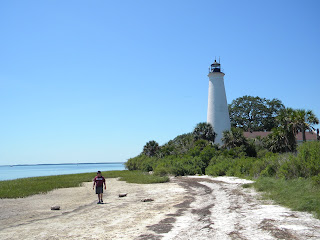I found these bugs having a party, a festival, yesterday afternoon on the first fruits of my yellow pear tomato plant. At first I thought they were assassin bug nymphs--something I've posted about before--which are beneficial insects for the most part, eating pests that chomp on my veggies and flowers. I say for the most part because they also fancy a fine meal like Caterpillar a l'orange Dog, and I now know that those bird-poo-like caterpillars are something special and not to be destroyed. At the citrus seminar I attended in Crestview several weeks ago, when the speaker suggested removal and disposal of the citrus-loving caterpillars, our extension agent spoke up for the poor things and suggested donating the orange dogs to the Panhandle Butterfly House. They grow into those magnificent giant swallowtail butterflies and are expensive to purchase. The speaker was surprised and a bit amused to hear that the Butterfly House would be thrilled to receive what most citrus growers consider a threat to their crop. As you can see here, citrus isn't exactly a trouble-free thing to grow. To get back to what I thought were assassin bugs, though, something did not seem right about these bright red bugs hanging out together and not trying to eat each other. I left them alone for two good reasons. One, it was getting ready to storm, and two, I didn't want to assume that they were on my plants for some evil purpose without doing a little more research.
I know what this stink bug can do to a plant. It will suck the juices right out of it, leaving nothing but dry bones. Would those bright red bugs take care of it for me? Not a chance. They are nymphs of the leaffooted bug, Leptoglossus phyllopus, not a good thing to find in the veggie garden, especially when I'm ready to start enjoying its first fruits of summer in this fine month of May. If I can't control them by picking them off one by one or shaking them en masse into a pan of soapy water, I guess I'll be sharing these first fruits. Of course, if you have any other suggestions, please share them with me, and we'll have something to feast on...
Green beans...
Bell pepper
I'd rather not use pesticides to control the pests. There are other assassins which visit the garden--besides the obvious ones--like my spider friend here. I hope she enjoys her own festival of first fruits and that she brings lots of friends to celebrate.
Please visit Ramblingwoods.com for this week's Nature Notes/Signs of the Season post and links to other bloggers' nature-related posts.













